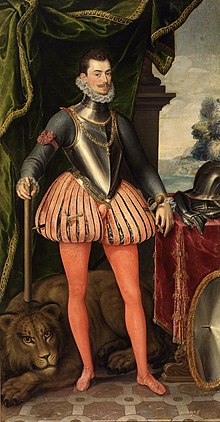Juan de Austria
| John of Austria | |
|---|---|

Oil in canvas, 2nd half of 16th century, probably by Juan Pantoja de la Cruz.
Museo del Prado, Madrid. |
|
| Born |
24 February 1547 Regensburg |
| Died | 1 October 1578 (aged 31) Bouge near Namur |
| Parent(s) |
Charles V, Holy Roman Emperor Barbara Blomberg |
John of Austria (24 February 1547 – 1 October 1578), in English traditionally known as Don John of Austria, in Spanish as Don Juan de Austria and in German as Ritter Johann von Österreich, was an illegitimate son of Holy Roman Emperor Charles V. He became a military leader in the service of his half-brother, King Philip II of Spain and is best known for his naval victory at the Battle of Lepanto in 1571 against the Ottoman Empire.
Born in the Free imperial city of Regensburg, Upper Palatinate, John of Austria was the product of a brief liaison between Charles V, Holy Roman Emperor (a widower since 1539) and Barbara Blomberg, a burgher's daughter and singer.
The date of his birth is unknown, with some sources indicating that he was born in the year 1545 and others, like G. Parker or P. Pierson, in 1547. Pierson makes mention that some contemporaries affirmed that he was born in 1545, but that the oldest evidence found in France with regards to public ceremonies, supports the date of 1547. It is likely that John of Austria was conceived in May 1546, when Emperor Charles V was then in Regensburg, which would make it probable that he was born in or around the 24 February 1547. It is possible that John had deliberately chosen the 24th of February as his birthday, which was the month and day of his father Charles V's birth. Shortly after giving birth, Barbara Blomberg was quickly married to Hieronymus Kegel (Jerôme Pyramus Kegel), a court functionary in Brussels. John of Austria's original name as a child, "Geronimo" or "Jeromín", was an allusion to his stepfather.
Charles V then decided that his son should be raised in Spain away from his mother. His Majordomo, Luis de Quijada, had reached an agreement (which was signed in Brussels on 13 June 1550) with Francisco Massy, a violist of the imperial court, and married to a Spanish woman, Ana de Medina. In exchange for an annual income of 50 ducats, the couple had agreed to raise the child. In mid-1551 they together had arrived in Leganés, where Ana de Medina had property.
...
Wikipedia
